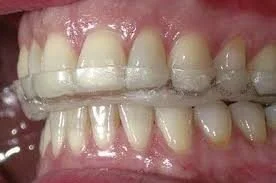What is Bruxism? - Symptoms, Causes and Treatment
What is Bruxism?
Bruxism is a subconscious condition of clenching or grinding of teeth when someone is not chewing or swallowing. It is termed parafunction as it is outside of what is considered a normal function. Bruxism usually occurs at night while sleeping, although some people do this during the day, usually while concentrating on something or working hard physically.
What Causes Bruxism?
There is no clear consensus as to the cause of bruxism. Some see sleep bruxism as a form of sleep disturbance. Awake bruxism is usually related to stress, either work, family pressures, anger, or frustration. Occasionally a disturbance in someone’s bite such as a tooth being ‘high in the bite’ can trigger bruxism, however not everyone with an interference like this grinds their teeth.
Bruxism does seem to affect people who are very physically or mentally active. Sometimes it can be brought upon by just a small trigger at night, such as wind blowing in trees. We do see more teeth grinding with Parkinson's Disease and also in people taking methamphetamines.
What Are the Symptoms of Bruxism?
An occlusal splint or bruxism mouth guard.
Teeth grinding can cause a variety of symptoms including:
Facial and temporomandibular joint pain
Headaches
Loss of sleep
Broken teeth
What Happens When I Grind My Teeth?
When people grind their teeth, the teeth spend a massive amount of time in contact, much more than in normal function. It can range from 10-15 minutes to 3-4 hours of tooth contact per day. A side effect of sleep bruxing is an increase in the size and strength of the muscles of mastication, namely the masseter and temporalis muscles. As these muscles increase in strength, so does wear and the increase in fractures and cracks in teeth. Also, the shape of the face takes on a square appearance due to the muscle bulk at the angle of the lower jaw. Over time, the results can be devastating. This is exacerbated at night as the protective reflex that governs how much force we put on our teeth also goes to sleep. When this occurs, massive forces can be applied upon our teeth - up to 4 times higher than normal.
If the tooth above has cracked through the crown, into the nerve and root. This tooth will need to be removed and replaced. We see many of these fractures as a result of bruxing and teeth grinding.
A cracked tooth caused by bruxism.
How Can I Stop Grinding My Teeth?
Bruxism is very hard to stop or cure. There are medications that will control it, however, the complications are usually worse than the condition itself. We usually treat sleep bruxism through different management techniques.
How Can I Treat Bruxism?
We usually treat bruxism in the early stages with a bruxism night guard or occlusal splint. This is a thin plastic plate that fits over the top teeth. The patient can then grind against that and wear the plate out rather than their teeth. The simple act of wearing the guard also reduces bruxism. Once considerable wear and fractures have occurred, more advanced treatment may be needed to restore fractured, worn, or lost teeth, followed by a bruxism mouthguard.
Injectables that relax muscles can be placed into the clenching muscles and reduce their strength. If bruxism is associated with pain in the muscles or joints, a physiotherapist may need to work on the muscles and joints of the head and neck. Please note that the jaw joint, or temporomandibular joint, is an unusual joint and it is recommended that you see a specialist physio with a high amount of experience in teeth grinding and jaw muscles.
Can Bruxism Go Away On Its Own?
People with less severe bruxism may notice their bruxism go away without treatment. However, it's best not to take that risk. Bruxism can cause further problems if left untreated for too long. If you notice you grind your teeth, you should let your dentist know at your next check-up appointment.
Does Bruxism Affect Children?
Bruxism can affect children too. Often it’s hard to know if your children grind their teeth. Signs you can look out for include grinding noises in your child’s sleep, complaints of jaw pain and pain when eating. Some children outgrow bruxism as they get older.
Like Adults, treatment for bruxism for children often involves a mouthguard. If a child wears a bruxism mouthguard to bed, it can be very effective in helping the muscles retone so that grinding and clenching during the day are reduced.
If you’re ever concerned about your child’s teeth, your family dentist should always be your first port of call.
Contact Your Local Dentist
Bruxism, or teeth grinding, is becoming more and more common with our increasingly busy lives. To prevent the devastating effects of bruxism such as worn and cracked teeth, it is incredibly important to start treatment as early as possible. If you have any questions or queries, please don’t hesitate to get in contact with the Cambridge City Dental team. We offer restorative dentistry, cosmetic dentistry, and general dentistry services. Book your appointment online or call us on (08) 9382 8266.


